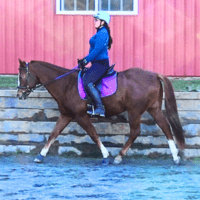“The 5-way horse vaccine” is yet another word you may have heard after becoming a horse owner.
Vaccinations can quickly become a complicated topic, especially for a new owner. A 5-way vaccine for horses is just another type of vaccine, but it is important to learn more before deciding if it is right for your horse.
In general, immunizations protect your horse from serious and dangerous diseases and are a must for every horse in order to ensure a happy, healthy life.
Vaccines essentially assist the equine immune system to create antibodies that defeat diseases if a horse becomes exposed to them.
If the horse does develop the disease, vaccinations can aid in decreasing the severity of the reaction.
Thanks to the ever-developing scientific world, immunization for equines has become easier with the development of the horse 5-way vaccine, which is essentially an all-in-one solution to several vaccines your horse needs in one shot.
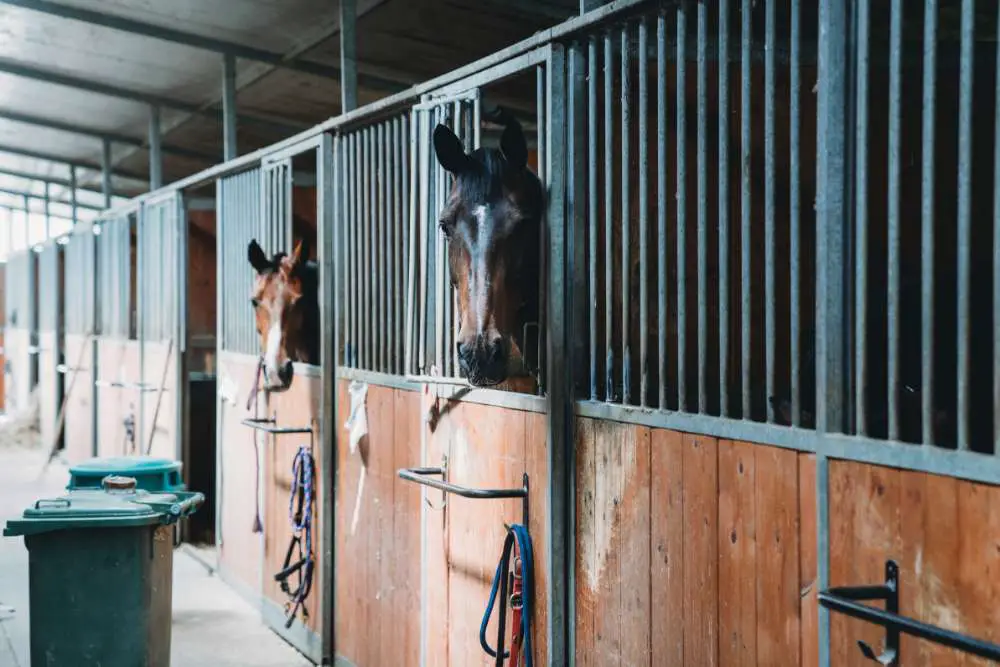
What Is a 5-Way Vaccine For Horses?
A “5-way” vaccine, as the name implies, protects horses from five different viruses.
However, not every vaccine manufacturer offers protection against the same viruses, whether a 5-way, 3-way, or 6-way vaccine.
There are all different kinds of multi-way vaccines.
Your best plan of action is to talk to your vet about what you’ve learned here and then ask any other questions you may have before getting your horse vaccinated.
A handful of these 5-way vaccines include immunization against:
- EEE (Eastern Equine Encephalitis)
- WEE (Western Equine Encephalitis)
- Tetanus (tetanus toxoid)
- Influenza (the “flu”)
- Equine Herpesvirus (“Rhinopneumonitis,” also known as “Rhino”)
A vaccine like this protects your horse from respiratory disease, bacterial infections that cause muscle spasms, and fatal infections that cause brain inflammation.
Rabies is a deadly disease that is not included in the 5-way vaccine but is a must-have for any horse. Some companies include “+WVN” (which means plus West Nile Virus) in the 5-way vaccine.
This means that the shot includes immunization against the West Nile Virus, making the shot “6-way.”
What’s The Difference Between A 4-Way, 6-Way And 7-Way Vaccine?
The main difference is how many viruses each vaccination protects against.
A 4-way equine vaccine may include protection against Tetanus, Eastern Encephalomyelitis, Western Encephalomyelitis, and the West Nile virus.
Meanwhile, a 6-way equine vaccine may add immunization against Influenza and Rhinopneumonitis.
The 7-way equine vaccines also include immunization against equine Herpesvirus.
However, these different vaccines will vary from company to company and which one is best for your horse will depend on your vaccination plan.
What Are The Core Vaccinations?
There are five vaccines that are given to most horses on a regular basis, and four of them are commonly included in the “five-way vaccine.”
Core vaccines are given against:
- Rabies
- Tetanus
- Eastern and Western Equine Encephalitis
- West Nile Virus.
These core vaccinations are also often given to horses annually. Additional vaccinations may be needed for horses exposed to viruses and diseases common in certain areas.
What Are The Non-Core Risk-Based Vaccinations?
There are four vaccines against less common diseases that are given to horses based on their environment and the risk of being exposed to the viruses.
These are called “non-core risk-based vaccines.”
These non-core vaccines are given against:
- Equine Herpesvirus (Rhinopneumonitis)
- Equine Influenza
- Strangles
- Potomac Horse Fever.
Horses that receive these vaccines are typically at higher risk.
These are additional preventative measures for horses that may be:
- under 6 years old
- are competition horses
- travel off the property often
- are horses on breeding farms
- are in contact with pregnant mares
What 5-Way Horse Vaccines Are Available?
There are several companies currently producing 5-way vaccines (and some provide 6-way or even 7-way immunization). Which one is the best depends on the horse, and the ultimate choice should be made with a qualified veterinarian.
Nonetheless, below is a comprehensive list of some of the most well-known 5-way (and some 6-way) vaccines available on the market:
Fluvac Innovator 5
This is a vaccination created by Zoetis that provides immunization against the
- sleeping sickness (Eastern and Western Encephalomyelitis)
- Tetanus
- respiratory diseases (often caused by herpesvirus EHV-1 and EHV-4)
- current A1 and A2 influenza strains.
A booster is needed two to four weeks after the first dose. Annual boosters are usually done each year after.
If the horse is frequently exposed to these viruses, then they may need this vaccine every three months.
Check prices at:
Core EQ Innovator
The first and only vaccination that provides protection against all five potentially deadly core horse illnesses in a single shot.
This vaccine is also created by the company Zoetis and can only be administered by a veterinarian.
This immunization protects from:
- rabies
- tetanus
- West Nile
- Eastern and Western equine encephalomyelitis (EEE, WEE)
Learn more at:
Prestige 5 + WNV
Prestige 5 + WNV was created by Merck.
This vaccine combines inactivated:
- Eastern and Western equine Encephalomyelitis Viruses
- equine Herpesviruses (Rhino EHV-1 along with EHV-4)
- Equine Influenza viruses
- Tetanus Toxoid
- West Nile Virus
Check prices at:
Equi-Jec 6 (5-Way + West Nile Virus) Vaccine
This vaccine, created by Equi-Jex, includes immunization against six viruses.
These viruses include:
- Eastern Encephalomyelitis
- Western Encephalomyelitis
- West Nile Virus
- Influenza
- Herpesvirus
- Tetanus
The company claims that their vaccination is best for people who choose to vaccinate their horses themselves.
Check prices at:
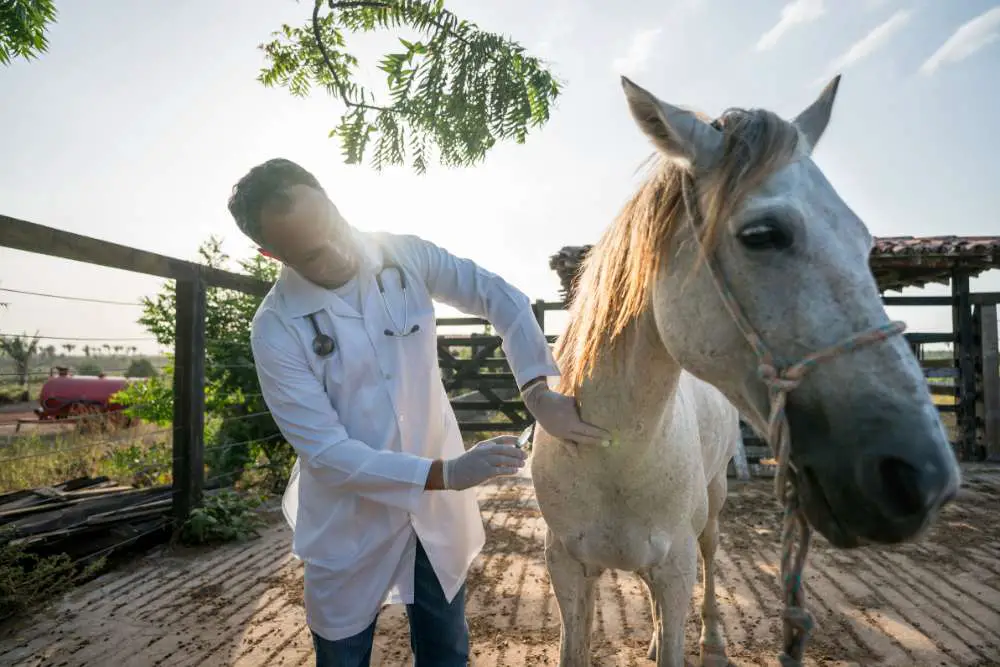
Is A 5-Way Vaccine Higher Risk For Horses than Individual Vaccines?
A 5-way vaccine can be more risky for horses than an individual vaccine because having time between vaccinations allows the equine body to have more time to adapt to each immunization.
Administering five vaccines at once can be overwhelming for an equine’s body, and it also makes it difficult to track what the horse has been immunized against.
In addition, if the horse experiences an allergic reaction to one of the vaccines, it will be more challenging to assess which particular vaccine(s) caused that reaction.
Research has also shown that the equine immune system has a higher level of antibodies (which is the ultimate goal of vaccination) after individual vaccines rather than a combination of vaccines.
Which Horses Can Get A 5-Way Vaccine Safely?
Just about any horse can get a 5-way vaccination safely.
Foals can get vaccinated as early as three months old (this usually only occurs if the foal is from an unvaccinated mare).
A foal from a vaccinated mare starts to receive immunization at 6, 7, and 12 months old.
Younger horses need to be vaccinated more frequently due to a weakened immune system, hence why they need a total of three doses.
Fully mature horses (including pregnant mares up to four to six weeks prior to foaling) should be vaccinated annually from all of the core diseases.
The 5-way vaccine also safely covers competition horses, as the Fédération Equestre Internationale (FEI) requires only three of the vaccinations included in the 5-way shot.
The FEI states that all competing horses need to be vaccinated against equine influenza, equine rhinopneumonitis, and tetanus.
However, caution should be taken with horses who are known to have severe reactions to vaccinations (and in some cases, exemptions should be granted).
Potential Side Effects Of 5-Way Vaccines For Horses
Although side effects are common, most should go away within 48 hours of vaccination.
Common Side Effects
The most common side effects of a 5-way vaccine are:
- soreness near the injection site
- lack of appetite
- decrease in the horse’s energy levels
Uncommon Side Effects
However, more serious is the possibility of an adverse reaction, which should be evaluated by a qualified veterinarian immediately.
These uncommon side effects include:
- local muscular swelling
- signs of fever
- signs of anorexia
- signs of lethargy
Other potential but rare reactions include:
- urticaria
- purpura hemorrhagica
- colic
- anaphylaxis
It is vital to keep a close eye on the injection site and the horse’s overall state after the vaccination. For more on possible adverse reactions, please click here.
What Should I Do If A Vaccine Gives My Horse An Allergic Reaction?
The first thing to do is talk with the vet and discuss available treatments.
Sometimes, mild allergic reactions can go away on their own. Careful observation and proper rest should be given to any horse recovering from a reaction.
If the horse has developed an abscess, that will need to be drained.
If there is extreme swelling, the veterinarian may offer anti-inflammatory medication.
In severe cases, a horse can experience anaphylactic shock (normal breathing will be blocked and blood pressure will decrease rapidly), which will need immediate veterinary treatment.
This type of reaction usually occurs within 30 minutes of administering the immunization, but sometimes it can happen within 24 hours.
Is it Safe to Ride my Horse Before or After Vaccination?
In general, horses should be given sufficient time for rest after vaccination. But as long as there is enough time to cool down before administering a vaccination, riding before hand shouldn’t be an issue.
Ultimately, in order to maximize the effectiveness of a vaccination, it is recommended to wait two weeks before starting to ride again.
This amount of time, however, can vary widely with each individual horse, and it is therefore important to consult your veterinarian.
Some veterinarians may recommend only light work for several days after, while others might say that two full days off is sufficient.
Will My Horse Need A Booster With A 5-Way Vaccine?
Whether or not your horse needs a booster will depend on their overall health, lifestyle, and age. Some horses need a booster shot given to them weeks or months after the first dose; others might be fine without one.
There are three factors to consider and discuss with your vet:
- the time of year the vaccine was administered
- the type of vaccine that was administered
- the horse’s condition and lifestyle
How Long Does Immunity Last For A 5-Way Horse Vaccine?
A 5-way equine vaccine lasts around six to 12 months.
However, some horses will need booster shots depending on their:
- age
- health
- lifestyle
- the exposure factor
In general, most adult horses will need to receive the vaccination annually in order to have sufficient protection from the common diseases.
Is It Cheaper To Do A 5-Way Vaccine Than An Individual Horse Vaccines?
A five-way vaccine can initially be more expensive than an individual vaccine, with the average retail price of around 30 to 50 US dollars.
However, the cost of individual vaccines does add up, and the 5-way vaccination can end up being cheaper.
Individual vaccination costs around 16 to 30 US dollars.
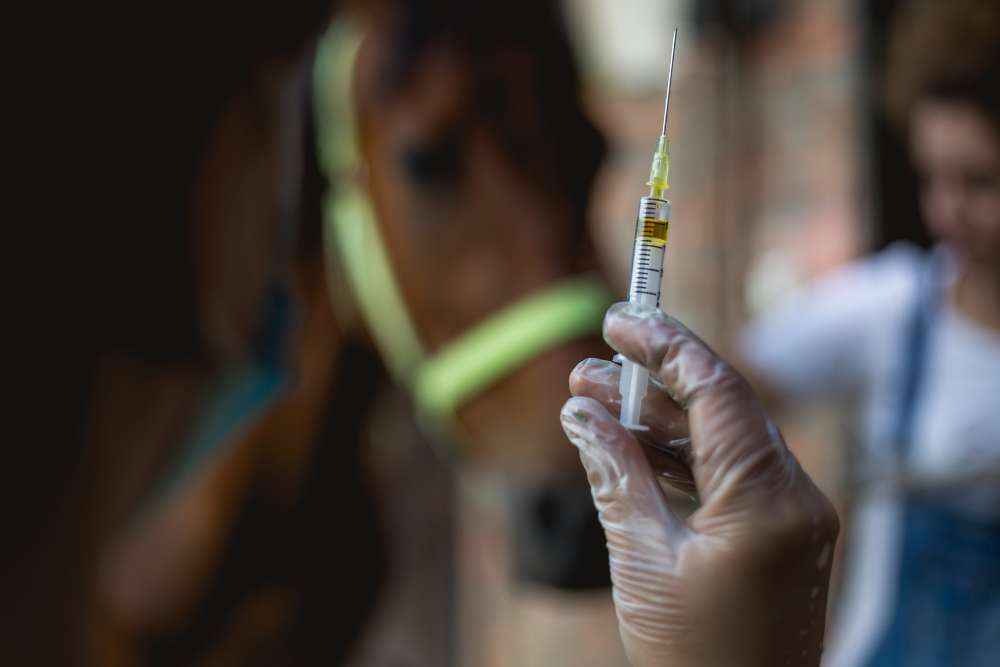
Is It Okay If I Give My Horse Vaccines Or Should I Leave It For the Vet?
Always leave vaccinations to qualified professionals when possible, as they are the ones who know the most recent guidelines, how to properly administer the vaccine, and are actually legally qualified to do so.
However, if one is unable to have their veterinarian administer a vaccination, the next best thing to do is consult the vet over the phone, conduct as much research as possible prior to giving the shot.
Make sure that the vaccination that is being administered is safe (e.g., properly packaged), and always purchase your vaccinations from reliable sources.
I am not a vet, but when I was in college for Equine Industries at the University of Massachusetts, the school’s vet had all of us vaccinate the forty-plus horses in the main barn. He taught us where and how to administer the vaccine.
After this experience, I started vaccinating my own horses. Except I did not vaccinate for the Rabies vaccine (which is illegal to administer in Massachusetts unless you are a veterinarian), my vet did that one.
I also did have my own vet supervise me the first couple times I did my own horses.
When I vaccinated my horses, I made sure to keep my vet informed, so that they would be aware, for my horses’ records, and in case there was a reaction. Luckily, no mishaps with vaccination have ever happened with my horses.
Equine vaccinations can be purchased from online retailers, veterinary clinics, or even tack stores (or feed stores.)
Personally, I have purchased vaccines from Valley Vet over the internet and Tractor Supply in store.
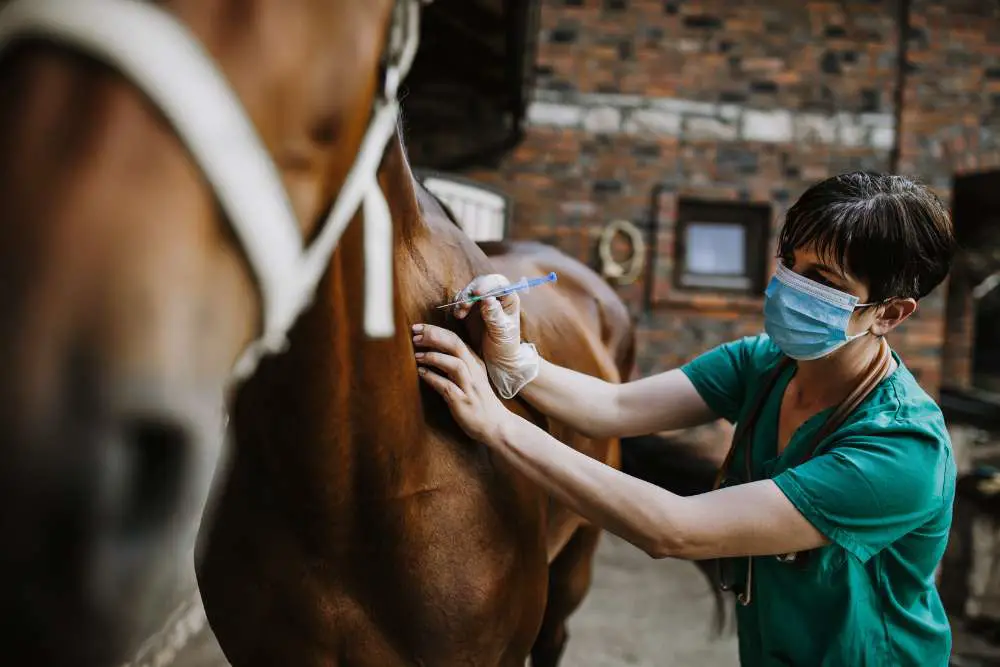
Where Are A Horse’s Vaccination Sites?
Vaccination sites for horses will differ depending on the type of vaccine being administered.
The most common sites for equine vaccinations tend to be the neck, shoulder, and thigh.
However, as mentioned above, it is important to consult with a veterinarian to determine the best location for equine vaccinations.

Is A 5-Way Vaccine Right For Your Horse?
There are pros and cons to consider when deciding if a 5-way or multi-way vaccine is right for your horse.
The 5-way horse vaccination is a generally safe, less expensive, and yet effective alternative to individual immunizations.
It gives immunization from the five different viruses (often including EEE, WEE, Tetanus, Influenza, and equine Herpesvirus).
Some companies also include vaccination from West Nile Virus, making the immunization “6-way” and sometimes even “7-way” if other viruses are included.
Although these types of vaccines can be administered to basically any horse, it is important to note that there are some risks with these vaccinations.
Not only does it not allow for the horse’s body to have the same amount of recovery time (because there is no time between vaccinations), but it also makes tracking down the source of potential allergic reactions more difficult.
So discuss what you learned with your vet and ask any questions you may have to decide whether a multi-way vaccine is the right choice for you and your horse.
Cheers, Kacey

